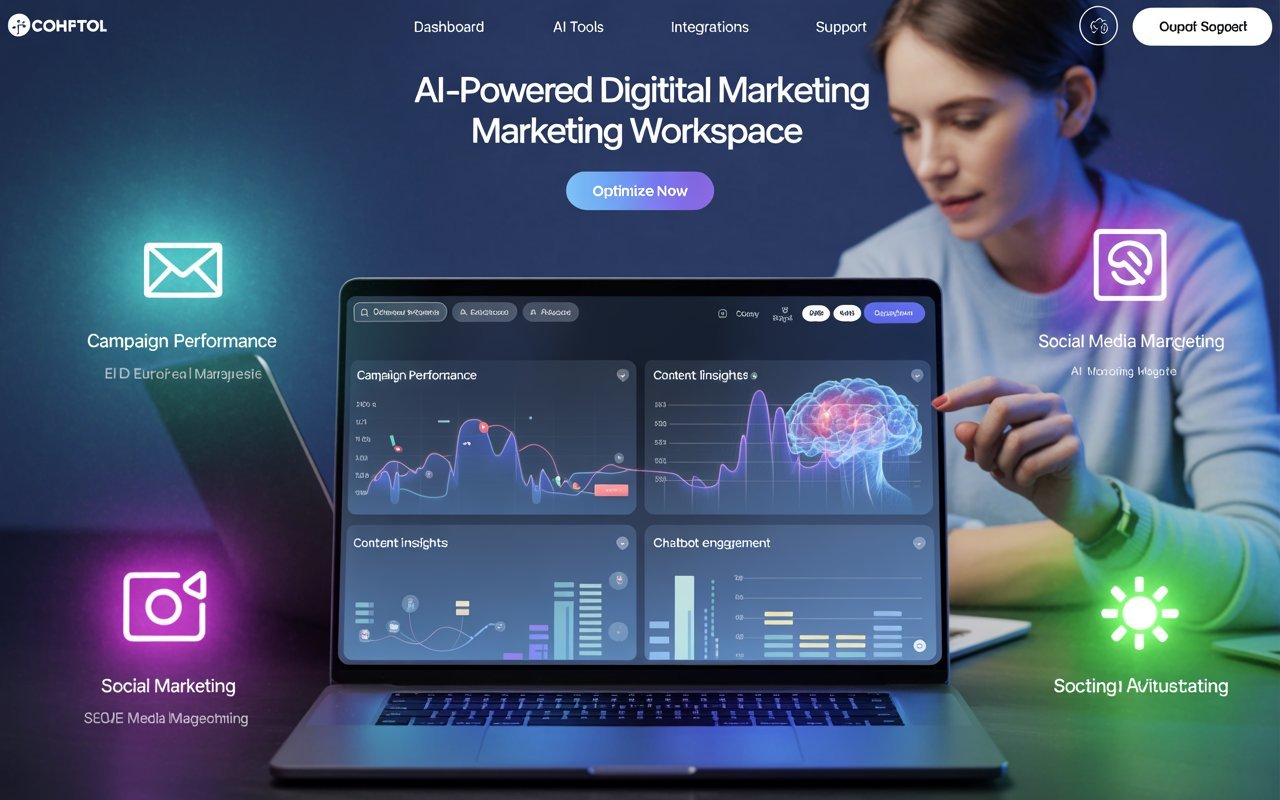Revolutionizing Marketing with AI: Smarter Campaigns, Better Results

Revolutionizing Marketing with AI: Smarter Campaigns, Better Results
Artificial Intelligence (AI) is no longer a futuristic concept it’s actively transforming how businesses market to their audiences. In today’s competitive digital world, traditional marketing strategies alone aren’t enough to capture attention or convert leads. AI empowers businesses to build data-driven campaigns, automate repetitive tasks, and personalize experiences at scale delivering more relevant content to the right audience, at the right time.
What Is AI in Marketing?
AI in marketing involves technologies like machine learning, natural language processing (NLP), and predictive analytics to analyze data, understand user behavior, and optimize strategies. These tools enable marketers to segment customers precisely, forecast trends, and adjust campaigns in real-time.
The Rise of Personalized Marketing
One of AI’s greatest strengths lies in personalization. With access to user data from browsing history, past purchases, and engagement patterns, AI can tailor content recommendations, email campaigns, and even website experiences. This hyper-personalization results in increased engagement, stronger customer relationships, and better ROI.For example, Netflix and Spotify use AI to recommend shows and songs users are likely to enjoy based on individual preferences. E-commerce platforms like Amazon and Shopify suggest relevant products, increasing upsell opportunities.
Streamlining Campaign Management
Manual campaign management can be time-consuming and error-prone. AI simplifies this with automation tools that schedule social posts, manage email lists, optimize ad targeting, and even generate performance reports. Marketers can set parameters, and the AI will handle execution—learning from each result to improve the next action.With platforms like HubSpot, Marketo, and Salesforce Marketing Cloud, businesses can automate A/B testing, measure performance metrics, and retarget users who abandon carts or drop off at certain funnel stages. This level of automation helps save time, reduce overhead, and increase efficiency.
Advanced Analytics for Smarter Decisions
AI analyzes vast amounts of structured and unstructured data—far more than a human team could process. These insights help businesses:- Identify high-performing channels
- Pinpoint customer pain points
- Discover emerging trends
- Optimize pricing strategies
With AI-driven dashboards, marketing leaders can track KPIs in real time and make data-backed decisions. Predictive analytics also enables marketers to forecast customer lifetime value (CLV), churn rates, and buying behaviors, refining the overall strategy.
Identify high-performing channels
Pinpoint customer pain points
Discover emerging trends
Optimize pricing strategies
Smarter Content Creation
AI writing assistants like Jasper, Copy.ai, and ChatGPT help marketers generate high-quality blogs, social posts, ad copy, and email campaigns. These tools save time and ensure content is consistent, engaging, and SEO-optimized.AI can also help with content ideation. Based on current industry trends or competitor analysis, it can suggest topics likely to attract traffic. Marketers then fine-tune the content to align with their voice and goals.
Real-Life Applications of AI in Marketing
Businesses across industries are adopting AI:- Retail: Brands use AI for demand forecasting, visual search, and in-store behavior analytics.
- Finance: Financial institutions implement AI for fraud detection, personalized banking offers, and customer engagement.
- Healthcare: Hospitals use AI for patient segmentation and tailored outreach campaigns.
Whether it’s enhancing chatbots for customer service or optimizing digital ads on Google and Meta, AI makes marketing faster, smarter, and more customer-centric.
Retail: Brands use AI for demand forecasting, visual search, and in-store behavior analytics.
Finance: Financial institutions implement AI for fraud detection, personalized banking offers, and customer engagement.
Healthcare: Hospitals use AI for patient segmentation and tailored outreach campaigns.
Challenges in Adopting AI
Despite its benefits, there are hurdles:- Privacy Concerns: AI depends on user data, which must be handled ethically and in compliance with GDPR and similar regulations.
- Bias in Algorithms: AI tools trained on biased data can reinforce stereotypes or exclude user groups. Human oversight is essential.
- Cost & Integration: Implementing AI may require upfront investment and workflow changes. Teams need training to get the most out of new systems.
Privacy Concerns: AI depends on user data, which must be handled ethically and in compliance with GDPR and similar regulations.
Bias in Algorithms: AI tools trained on biased data can reinforce stereotypes or exclude user groups. Human oversight is essential.
Cost & Integration: Implementing AI may require upfront investment and workflow changes. Teams need training to get the most out of new systems.
Future Trends in AI Marketing
The next wave of AI in marketing includes:- Voice Search Optimization: As smart speakers grow, optimizing content for voice search will become crucial.
- Visual Recognition: Platforms will use AI to interpret visual content, enabling advanced image-based product searches.
- Emotion AI: By analyzing facial expressions and tone, future tools will assess emotional responses and adjust messaging in real time.
Voice Search Optimization: As smart speakers grow, optimizing content for voice search will become crucial.
Visual Recognition: Platforms will use AI to interpret visual content, enabling advanced image-based product searches.
Emotion AI: By analyzing facial expressions and tone, future tools will assess emotional responses and adjust messaging in real time.